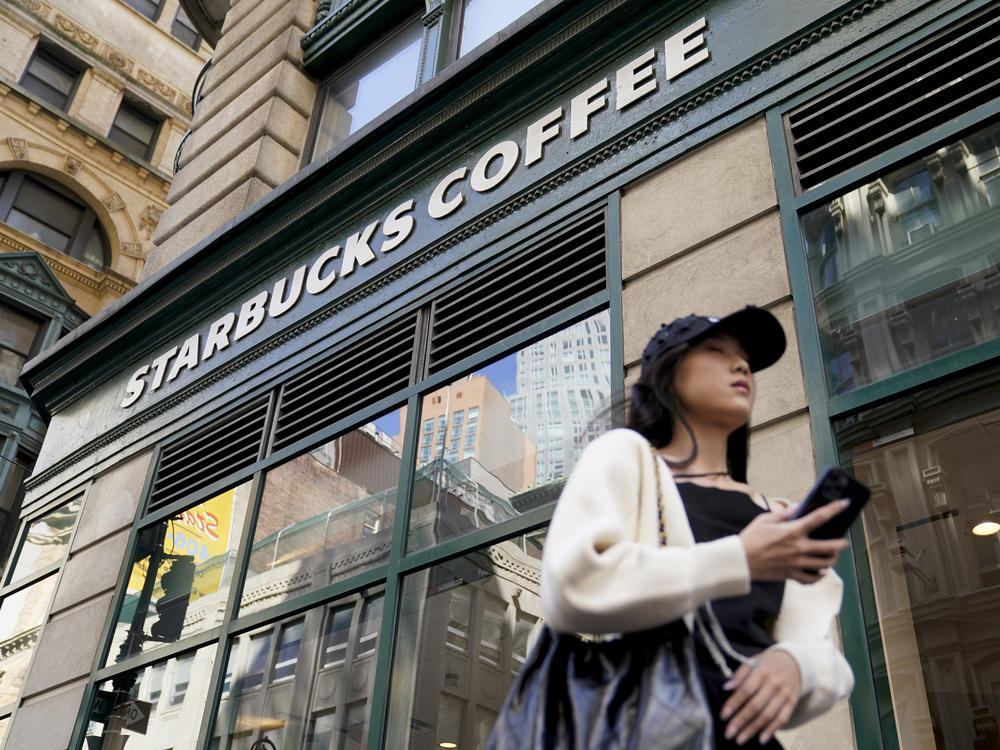Section Branding
Header Content
Fed-up consumers are increasingly going after food companies for misleading claims
Primary Content
Mango Dragonfruit Starbucks Refreshers are missing mango, Strawberry Açaí Starbucks Refreshers lack açaí and Pineapple Passionfruit Starbucks Refreshers have no passion fruit.
That's what two consumers who have sued Starbucks for consumer protection law violations say about the coffee giant's fruit-based drinks. This week, a federal judge in Manhattan ruled their case could move forward.
A spokesperson for Starbucks says the allegations in the suit are "inaccurate and without merit." Company attorneys argue in court filings that some of the words in its product names refer to flavors — not ingredients — and that baristas could have explained that to customers who asked.
But U.S. District Judge John Cronan said in his opinion that "a significant portion of reasonable consumers could plausibly be misled into thinking" that Starbucks Refreshers include the fruit in their names.
It's the latest example of a recent legal trend that's seen fed-up consumers taking major food and beverage companies to court over what they say is fishy advertising.
Plaintiffs typically argue that companies are going beyond simple marketing hyperbole and misrepresenting their food and drinks — whether it's promising ingredients that aren't there or displaying promotion images that don't match the real-life items.
There has been a smorgasbord of accusations in recent years: Barilla pasta isn't made in Italy. Burger King's Whoppers are smaller than they appear. The "boneless wings" served at Buffalo Wild Wings aren't actually chicken wings. Subway's "100% tuna" sandwiches either partially or completely lack tuna. Taco Bell skimps on the fillings in its Mexican Pizza, Crunchwrap Supreme and more.
"In general, companies can say great things about their product and make any kind of opinion claims they want to make about it. They can even say it's the best in the world," said Louis Tompros, an intellectual property attorney at the law firm WilmerHale in Boston.
"Opinion claims about a product are called puffery, and they're perfectly fine under false advertising law. What false advertising law does not allow is a false factual claim," he said.
While some companies have succeeded in getting cases against them tossed out of court, other legal food fights have resulted in high-priced settlements.
A&W Concentrate Co. agreed to pay up to $15 million to settle claims that its root beer and cream soda weren't "made with aged vanilla," as the labels suggested. In 2014, Red Bull announced it would pay more than $13 million to settle a lawsuit brought by buyers who said the energy drink didn't — as the marketing materials promised — "give you wings."
According to Kevin McTigue, a clinical professor of marketing at Northwestern University's Kellogg School of Management, a growing mistrust of companies and the ability for people to widely share their food and drink mishaps online may be contributing to the uptick in litigation.
But he notes that, when it comes to product photography, companies have always tried to make their offerings look as appealing as possible in ads.
"I think it'd be a stretch to think that consumers would walk into a restaurant and think that the cheeseburger that they're going to get wrapped up in paper and stuck in a bag is going to look exactly like the one they see in the picture," McTigue said.
Still, the appetite for these kinds of lawsuits appears to be growing.
According to Perkins Coie, a law firm that tracks such cases, 214 class-action lawsuits were filed against the food and beverage industry in 2022, and 331 cases were brought the year before.
It's a major uptick from the 81 cases filed in 2014, less than a decade earlier.
Tompros, who is also a lecturer at Harvard Law School, said some law firms specialize in food and beverage false advertising cases and recruit plaintiffs to be part of a possible class action.
When companies settle cases, payouts to an individual consumer may be small, but attorneys' fees can be substantial.
"There's a great incentive for law firms to try to identify even small-value misstatements in advertising and then bring a class-action suit, because the attorneys' fees from that suit can make it worthwhile for the firms," he added.
Though not every case may result in a monetary settlement, experts say the uptick in deceptive-marketing cases may cause companies to be more cautious in their ads in the future.
Copyright 2023 NPR. To see more, visit https://www.npr.org.

